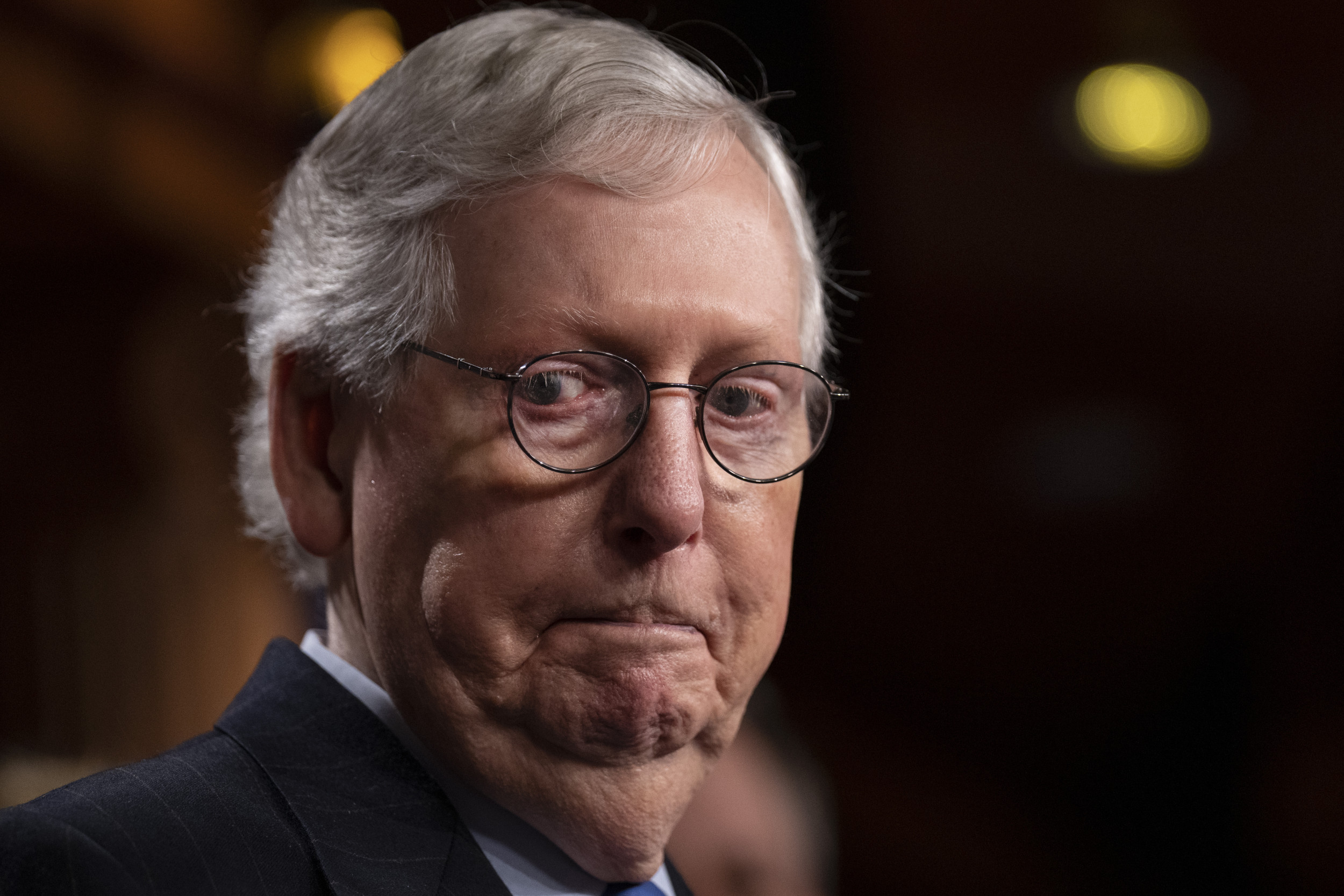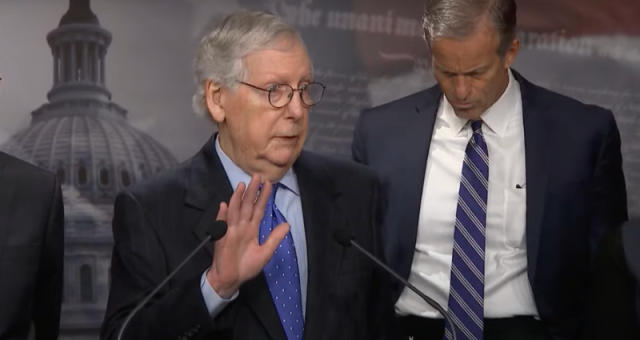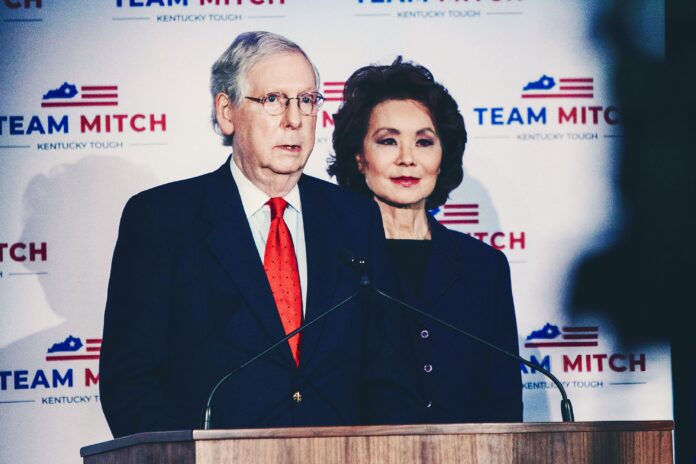In the landscape of American politics, Mitch McConnell stands as a high-profile figure, especially recognized for his role as the Senate Majority Leader. Navigating the complex world of legislation, McConnell’s positions and actions are frequently under scrutiny, with every vote having potential implications for his constituency and national policy.
Discussions around social topics, including interracial marriage, often gain significant attention, as they reflect broader societal values and the evolving nature of American legislative principles. Understanding McConnell’s voting history provides insight into his political stance and the direction of conservative policymaking.

Credit: www.newsweek.com
Introduction To The Controversy
The political realm buzzed with chatter when speculation rose about Senator Mitch McConnell’s stance on interracial marriage. The discourse centered not just on personal beliefs but on legislative action—the sacred act of casting a vote that reflects one’s principles and those they represent. This blog post dives into the layers behind a vote that gained national attention, detailing the context, the political history of the senator, and the fiery public reaction that ensued. Prepare to navigate through the complexities of this debate that shook the social and political landscape.
Contextualizing The Vote
In recent events, discussions ignited over a much-publicized vote implicating several high-profile politicians, including Senate Minority Leader Mitch McConnell. The vote raised essential questions on the state of equality and racial boundaries in marriage. It’s critical to examine not only the fine print of the legislation but also the social and historical implications of such a pivotal moment in political discourse.
Mitch Mcconnell’s Political Background
Understanding the significance of McConnell’s vote requires a look back at his extensive political career. With a tenure spanning decades in the Senate, McConnell is known for his strategic legislative moves and his influential voice in national politics. This section will outline the Kentucky senator’s rise to prominence, highlighting key moments that have defined his approach to governance and his conservative philosophy.
Mitch McConnell has been a pivotal figure in American politics, often renowned for his astute strategy and staunch conservative stance. The intersection of his political journey with the vote on interracial marriage casts a spotlight on his ideological leanings, further complicating the public’s perception of his legislative record.
Public Reaction To The Interracial Marriage Vote
The vote concerning interracial marriage did not unfold in isolation. Instead, it sparked a torrent of public discourse, cutting across party lines and igniting fervent discussions on social media and news outlets alike. In this section, we will sift through the myriad reactions that emerged in the aftermath, dissecting the reflections of both proponents and opponents of the stance taken by Senator McConnell.
- Individuals across the nation voiced their opinions.
- Insightful analyses by political commentators offered varied interpretations.
- Social media became a battleground for debate and discussion.

Credit: news.yahoo.com
Historical Perspective On Interracial Marriage In The Us
The mosaic of laws and attitudes regarding interracial marriage in the United States paints a historical tableau of both division and union. Browsing through the annals of US history reveals a story of evolving societal norms and legislative actions that together sketch the burgeoning recognition of interracial relationships.
Legislative Milestones
The legal tapestry surrounding interracial marriage was once a patchwork of prohibitive statutes known as anti-miscegenation laws. These regulations were state-level barriers to marriage between individuals of different races.
- 1883: The Supreme Court upholds anti-miscegenation laws in Pace v. Alabama.
- 1948: California leads a progressive turn with Perez v. Sharp, overturning its ban on interracial marriage.
- 1967: A monumental leap occurs as the Supreme Court decides Loving v. Virginia, which invalidates all state laws prohibiting interracial marriage.
Supreme Court’s Landmark Decisions
In the Supreme Court’s storied history, certain cases stand out as pivotal landmarks shaping the course of interracial unions.
- 1967 – Loving v. Virginia: Perhaps the most celebrated case, Loving v. Virginia, topples the remaining anti-miscegenation laws, affirming the right to marriage regardless of race under the Equal Protection and Due Process Clauses of the 14th Amendment.
- 2015 – Obergefell v. Hodges: Although focused on same-sex marriage, this decision further solidifies the principles of freedom to marry and equality, echoing sentiments that bolster the legal acceptance of interracial marriage.
Cultural And Societal Shifts Over Time
From taboo to acceptance, the social perspective on interracial marriage reflects a dynamic shift towards inclusivity.
| Time Period | Societal Attitude |
|---|---|
| Before 1960s | Interracial relationships often faced widespread stigma and outlaw. |
| 1970s – 1990s | Gradual increase in societal acceptance as cultural barriers begin to erode. |
| 2000s – Present | A broad acceptance emerges, and interracial marriage is commonly seen in media, reflecting a modern, diverse society. |
Analyzing The Claims Against Mitch Mcconnell
In the complex and often polarized realm of political discourse, claims about a public figure’s voting record can provoke widespread controversy and debate. Recently, allegations that Senate Majority Leader Mitch McConnell voted against interracial marriage have circulated online, raising questions and a need for clarity. This section delves into these claims, separating fact from fiction and examining the evidence at hand regarding Senator McConnell’s legislative history and public stance on interracial marriage.
Origin Of The Claims
The roots of these allegations can often be traced back to social media posts and politically charged discussions. In a climate where misinformation can spread swiftly, it’s essential to consider the source of such claims. These assertions may arise from misinterpretation of statements, voting records, or out-of-context snippets of a politician’s career.
Fact-checking The Vote Record
When investigating the voting record of a politician, consulting official legislative documentation provides the most accurate information. Recent queries into McConnell’s vote history pertaining to marriage rights, specifically interracial marriage, reveal that:
- No recent vote has taken place in Congress directly concerning the legality of interracial marriage.
- Mitch McConnell’s voting record does not show direct opposition to interracial marriage.
- Assertions to the contrary may stem from a misunderstanding of legislative actions or symbolic votes that do not hold legal power.
Mcconnell’s Statements And Stance On The Matter
To gauge the true stance of Senator McConnell on interracial marriage, one must analyze his public statements and positions on related issues. Mitch McConnell has not made any explicit proclamations against interracial marriage. Evaluating a politician’s words alongside their actions is critical in drawing conclusions about their perspectives. Any claims implying McConnell’s resistance to the issue should align with documented evidence of such public declarations for credence.
The Role Of Social Media In Spreading Information And Misinformation
The role of social media as a catalyst in the spread of both information and misinformation is unprecedented. Platforms once seen as tools for connectivity are now powerful channels influencing public opinion and shaping political discourses. A stark illustration of this dual nature is evident in the widespread rumors concerning Mitch McConnell’s vote on interracial marriage. The story, steeped in controversy, exemplifies the speed at which information can be circulated and, mistakenly or not, accepted as fact.
How The Story Gained Traction
The spread of the McConnell rumor, much like many others, exemplified the powerful ripple effect inherent to social media. A spark of erroneous reporting can ignite a wildfire of shares, likes, and retweets, crossing from one online community to another at digital light speed. Within this whirlwind, the distinction between ‘source’ and ‘echo’ becomes blurred as individuals and groups add their voices to the cacophony, each amplification adding a layer of seeming credibility to the claim.
The Impact Of Viral Misinformation
Virality has a price, particularly when it bears the weight of misinformation. The case with Sen. McConnell brings to light the profound effects such viral myths can have. Not only can they sow discord and distrust among the populace, but they also have the potential to wrongly influence public opinion and misshape the reputations of individuals involved. This phenomenon raises significant concerns about the standards and practices of information sharing in the digital age.
The Importance Of Media Literacy In Politics
In today’s world, where politics and social media are inextricably linked, media literacy has never been more crucial. The public’s ability to critically evaluate the validity and source of information presented online is a vital defense against the tide of misinformation. Teaching, understanding, and applying principles such as cross-referencing sources and recognizing bias are fundamental skills that empower voters and contribute to a more informed and engaged citizenry.
The Political And Legal Implications Of Interracial Marriage Votes
The discussions and votes on issues of significant cultural and legal importance, such as interracial marriage, not only reflect present societal values but can also cast long shadows over the political landscape. Decisions made in legislative chambers reverberate through the corridors of legal precedence and influence the public perception of elected officials. A recent wave of online discourse targets the voting behavior of high-profile lawmakers, including Senate Minority Leader Mitch McConnell. Questions about votes related to legislation or resolutions that affect interracial marriage hold heavy political and legal weight.
Understanding The Senate’s Voting Procedures
The structure of Senate voting procedures is a key factor in discerning the motives and intentions behind a senator’s vote. Each vote holds the potential to shape legislation significantly. Here’s an overview:
- Roll Call Votes: Recorded votes on the Senate floor where each member’s position is made public.
- Voice Votes: A quicker method where senators respond verbally, but individual positions are not recorded.
- Unanimous Consent: A process where no objections signify that there is consensus.
Understanding the context of these procedures is critical when examining a controversial vote like McConnell’s supposed vote against interracial marriage, which has far-reaching political and societal implications.
How Votes Reflect On Lawmakers And Constituencies
Votes cast by Senators not only impact current legislation but also serve as a representation of their moral and ethical positions. Mitch McConnell’s actions in the Senate, or those of any elected official, can lead to:
- Public scrutiny or approval based on the perceived alignment with societal values.
- Changes in support from their constituency who may hold strong beliefs on the matter.
- A lasting record of their political legacy and representation in history.
Therefore, any vote related to interracial marriage can have profound implications for both the lawmaker and the voters they represent, potentially influencing future re-election prospects.
Future Political Prospects For Supporters And Detractors
The stand a political figure takes on issues like interracial marriage can be a bellwether for their future career. Supporters of progressive social policies may find greater resonance with a diversifying electorate, while detractors may appeal to a more conservative base. Some key areas to consider include:
| Position | Expected Support | Possible Repercussions |
|---|---|---|
| Proponent | Liberal constituencies, civil rights organizations | Backlash from conservative voters |
| Opponent | Conservative constituencies, traditionalist groups | Alienation of minority communities, potential political isolation |
In an ever-evolving political climate, these decisions can profoundly impact a lawmaker’s career trajectory as well as the broader political discourse. Mitch McConnell’s vote and that of others become benchmarks for where they stand in a historical framework of social justice and equality.

Credit: www.newsweek.com
Conclusion: Demystifying The Narrative
The debate surrounding Mitch McConnell’s voting record, particularly with regard to interracial marriage, has spurred a flurry of discourse and misinformation. In this conclusive section, we aim to clarify McConnell’s actual position, unravel the broader implications for civil rights legislation, and underscore the importance of integrity in political reporting. Understanding the nuances behind these developments is essential for an informed and objective reflection on the political landscape.
Summarizing Mitch Mcconnell’s Position
Mitch McConnell’s stance on interracial marriage has been the subject of significant speculation and misinterpretation. Reviewing his voting history and public statements, it becomes clear that McConnell has not cast a vote against interracial marriage. Critics often cite political maneuvering or legislative complexity, where McConnell’s broader voting record on civil rights issues comes into question. It is paramount to separate specific claims from generalized voting patterns. This delineation helps to ensure accuracy and fairness when evaluating a public figure’s policy positions.
The Broader Implications For Civil Rights Legislation
The discussion around McConnell’s votes opens a window to a larger conversation about civil rights protections in the United States. Legislation in this sphere often reflects deep-seated societal attitudes and can signal the direction of social progress. Debates in Congress not only address the specifics of the legislation but also embody the ongoing struggle to achieve equality for all citizens. Civil rights law is not just the product of political decisions; it is a mirror to the nation’s evolving values.
The Necessity Of Accurate Reporting In Political Discourse
In today’s fast-paced media environment, the truth can sometimes become a casualty of the race to break news. Reports of Mitch McConnell’s voting record serve as a cautionary tale about the need for due diligence in political journalism. Ensuring the accuracy of such reports is not just a journalistic responsibility; it is critical to maintaining a well-informed electorate. Accurate reporting underpins the very fabric of a functioning democracy, allowing citizens to make decisions based on facts rather than fallacies.
Frequently Asked Questions Of Did Mitch Mcconnell Vote Against Interracial Marriage
What Was The Supreme Court Vote On Interracial Marriage?
The Supreme Court vote on interracial marriage was unanimous, with a 9-0 decision in the 1967 Loving v. Virginia case, ending all race-based legal restrictions on marriage.
Did Mitch Mcconnell Oppose Interracial Marriage?
Mitch McConnell voted against a bipartisan measure that would have protected interracial marriages.
How Did Mcconnell Justify His Vote?
McConnell cited concerns over state rights rather than opposition to interracial marriage.
What Was The Outcome Of The Vote?
The measure failed to pass, with McConnell among those voting against it.
Has Mcconnell Commented On Interracial Marriage?
Previously, McConnell has not publicly opposed interracial marriage.
Which Bill Included Interracial Marriage Protection?
The bill was an amendment to the Respect for Marriage Act.
Conclusion
Dispelling myths requires clarity and facts, as we’ve seen with Mitch McConnell’s voting record on interracial marriage. The truth has been unpacked, revealing that misinformation often takes root in misunderstood actions. As voters and engaged citizens, it’s crucial to delve beyond headlines and seek the full story.
Let’s commit to informed discussions, setting the record straight where needed.

